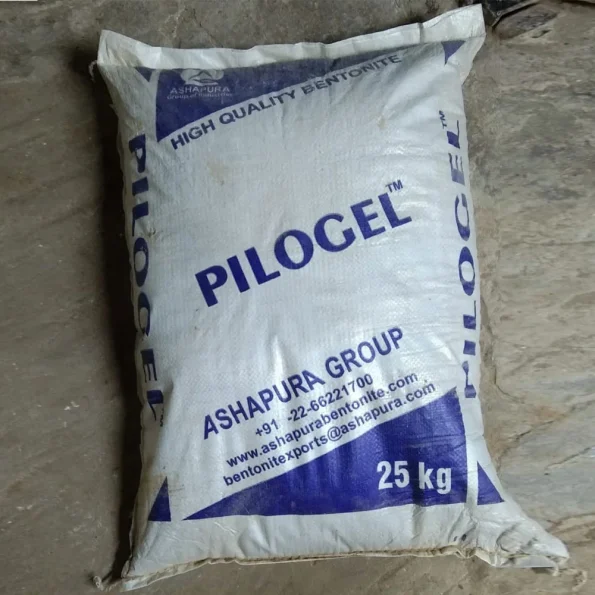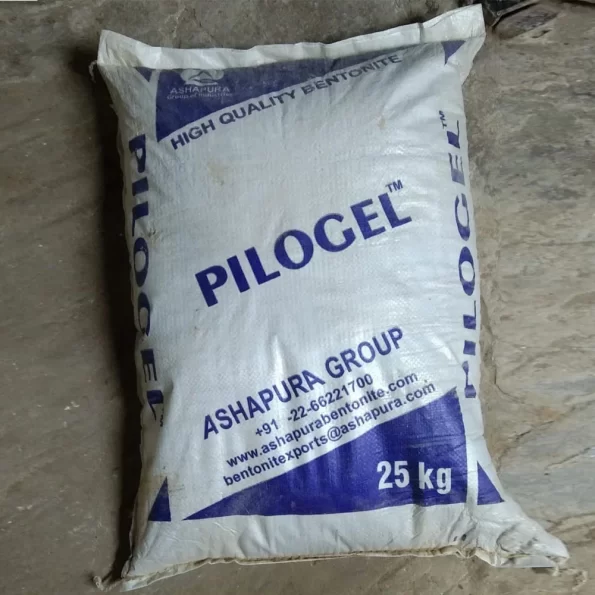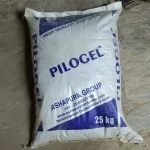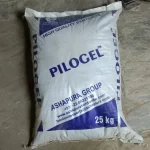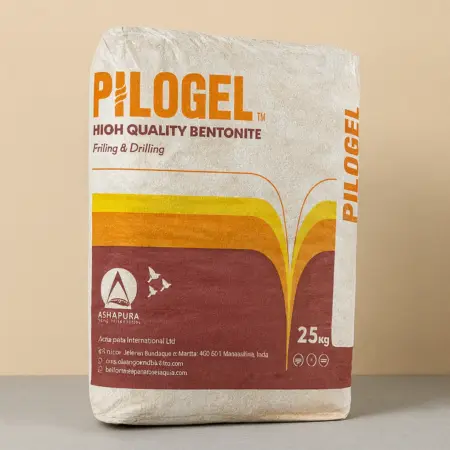Bentonite Powder Ashapurna Group of Industries.
High-quality bentonite powder for construction, drilling, and industrial applications.
Supplied in 25kg PP bags for reliable performance and easy handling.
Bentonite Powder (PILOGEL, Ashapurna Group) নির্মাণ, ড্রিলিং ও বিভিন্ন ইন্ডাস্ট্রিয়াল কাজে ব্যবহৃত একটি গুরুত্বপূর্ণ মিনারেল পাউডার। এটি পানি শোষণ ও সিলিং ক্ষমতা বেশি হওয়ায় সয়েল স্ট্যাবিলাইজেশন, বোরিং ও ফাউন্ডেশন কাজে কার্যকর পারফরম্যান্স দেয়। ২৫ কেজি PP ব্যাগে সরবরাহ করা হয় এবং ভারতে উৎপাদিত এই পণ্য বাংলাদেশে প্যাকিং করা হয়, ফলে মানসম্মত ও নির্ভরযোগ্য ব্যবহারের জন্য উপযোগী।
- Size Guide
🔒 কেন RTC Dhaka থেকে কিনবেন?
✔ ১০+ বছরের বিশ্বস্ত সরবরাহকারী
✔ সরকারি / বেসরকারি প্রতিষ্ঠান সাপ্লাই অভিজ্ঞতা
✔ অনলাইনে ভিডিও বা ছবি দেখিয়ে পণ্য কনফার্ম সুবিধা
✔ সারা বাংলাদেশে কুরিয়ার সার্ভিস
✔ বিক্রয় পরবর্তী সাপোর্ট ও গাইডেন্স
🚚 ডেলিভারি ও কুরিয়ার শর্তাবলী
• পণ্য কুরিয়ারের মাধ্যমে পাঠানো হয়
• ডেলিভারি সময় লোকেশন অনুযায়ী ভিন্ন হতে পারে
• কুরিয়ার চার্জ পণ্যের ওজন ও এলাকার উপর নির্ভরশীল
• কুরিয়ার গ্রহণের সময় প্যাকেট বাহ্যিকভাবে পরীক্ষা করুন
• ভুল ঠিকানা বা অনুপস্থিতির কারণে ডেলিভারি ব্যর্থ হলে পুনরায় চার্জ প্রযোজ্য
📦 পণ্য কনফার্মেশন নীতিমালা
• কুরিয়ারে অর্ডারের আগে ভিডিও বা ছবি দেখে পণ্য কনফার্ম করার অনুরোধ করা হচ্ছে
• পণ্য কনফার্ম করতে মোট মূল্যের ১০%–৭০% পর্যন্ত অগ্রিম প্রযোজ্য হতে পারে
• কনফার্ম করার পর প্রেরিত পণ্য সাধারণত ফেরতযোগ্য নয়
🔁 রিটার্ন নীতিমালা
• ডেলিভারির সময় পণ্য গ্রহণের আগে প্যাকেট পরীক্ষা করুন
• উৎপাদনজনিত ত্রুটি বা ভুল পণ্য হলে নির্দিষ্ট সময়ের মধ্যে জানাতে হবে
• ব্যবহৃত, ভাঙা বা গ্রাহকের কারণে ক্ষতিগ্রস্ত পণ্য রিটার্নযোগ্য নয়
• কাস্টমাইজড বা বিশেষ অর্ডারের পণ্য সাধারণত রিটার্ন হয় না
📞 যোগাযোগ
🏢 Office: Swantex Bhaban, 9/I, Motijheel C/A, Dhaka-1000
📧 Email: rtcdhaka2013@gmail.com
📱 Phone / WhatsApp:
+880 1831-016720
+880 1710-640355 - Delivery & ReturnDelivery 📦 কুরিয়ার কন্ডিশনের শর্তাবলী • পণ্য কুরিয়ারের মাধ্যমে পাঠানো হবে এবং ডেলিভারি সময় লোকেশন অনুযায়ী ভিন্ন হতে পারে। • কুরিয়ার চার্জ পণ্যের ওজন, আকার ও ডেলিভারি লোকেশনের উপর নির্ভরশীল। • কুরিয়ার রিসিভ করার সময় প্যাকেট বাহ্যিকভাবে ক্ষতিগ্রস্ত কিনা তা যাচাই করে নিন। • কুরিয়ার গ্রহণের পর কোনো দৃশ্যমান ক্ষতি বা সমস্যা থাকলে তাৎক্ষণিকভাবে আমাদের অবহিত করুন। • কুরিয়ার সার্ভিসের বিলম্ব বা অনাকাঙ্ক্ষিত সমস্যার ক্ষেত্রে ডেলিভারি সময় পরিবর্তিত হতে পারে। • ভুল ঠিকানা বা গ্রাহকের অনুপস্থিতির কারণে ডেলিভারি ব্যর্থ হলে পুনরায় কুরিয়ার চার্জ প্রযোজ্য হতে পারে। • কুরিয়ার সংক্রান্ত যেকোনো প্রশ্ন বা সহায়তার জন্য আমাদের সাপোর্ট টিমের সাথে যোগাযোগ করুন। পণ্যের বিস্তারিত জানতে আমাদের সাথে যোগাযোগ করুন। অনলাইনে ভিডিও বা ছবি দেখিয়ে পণ্য কনফার্ম করা যাবে। পণ্য কনফার্মের ক্ষেত্রে মূল্য অনুযায়ী ১০%–৭০% পর্যন্ত অগ্রিম প্রযোজ্য হতে পারে। 📌 পণ্য রিটার্ন নীতিমালা • ডেলিভারির সময় পণ্য গ্রহণের আগে প্যাকেট বাহ্যিকভাবে ক্ষতিগ্রস্ত কিনা তা যাচাই করে নিন। • পণ্য গ্রহণের পর যদি উৎপাদনজনিত ত্রুটি বা ভিন্ন পণ্য সরবরাহ করা হয়, সে ক্ষেত্রে নির্দিষ্ট সময়ের মধ্যে আমাদের অবহিত করতে হবে। • ব্যবহৃত, ভাঙা, পরিবর্তিত বা গ্রাহকের কারণে ক্ষতিগ্রস্ত পণ্য রিটার্নযোগ্য নয়। • পণ্য রিটার্নের ক্ষেত্রে অবশ্যই মূল প্যাকেজিং ও আনুষঙ্গিক সামগ্রী অক্ষত থাকতে হবে। • রিটার্নের অনুরোধ গ্রহণযোগ্য হলে, পণ্য যাচাই শেষে পরবর্তী ব্যবস্থা নেওয়া হবে। • কাস্টমাইজড বা বিশেষ অর্ডারের পণ্য সাধারণত রিটার্নযোগ্য নয়। • রিটার্ন সংক্রান্ত যেকোনো তথ্য বা সহায়তার জন্য আমাদের সাপোর্ট টিমের সাথে যোগাযোগ করুন। কুরিয়ারের মাধ্যমে অর্ডার করার পূর্বে গ্রাহককে পণ্যের ভিডিও বা ছবি দেখে পণ্য কনফার্ম করার জন্য অনুরোধ করা হচ্ছে। পণ্য কনফার্ম করার পর কুরিয়ারের মাধ্যমে প্রেরিত পণ্য সাধারণত ফেরতযোগ্য নয়। যেকোনো প্রশ্ন বা তথ্যের জন্য অর্ডারের পূর্বে আমাদের সাথে যোগাযোগ করার জন্য অনুরোধ করা হলো। 🏢 Office Address Swantex Bhaban, 9/I, Motijheel Commercial Area, Dhaka-1000, Bangladesh 📧 Email : rtcdhaka2013@gmail.com 📞 Phone / WhatsApp +880 1831-016720 +880 1710-640355
৳ 650 Original price was: ৳ 650.৳ 450Current price is: ৳ 450.
Bentonite Powder is a naturally occurring clay material widely used in construction, drilling, and industrial processes where binding, sealing, and moisture control are required. It expands when mixed with water and forms a stable, gel-like structure that supports various technical applications.
This bentonite powder is commonly used in piling work, bore drilling, diaphragm wall construction, and foundation projects. It helps stabilize soil and bore walls during drilling operations by preventing collapse and controlling groundwater movement. The material also improves work safety and accuracy in deep excavation work.
In industrial environments, bentonite powder serves as a binding and sealing material. It is used in foundries, refractory preparation, and mineral processing where controlled moisture retention and particle binding are important. Its fine particle size allows easy mixing and uniform application across different processes.
The powder offers consistent performance due to its stable mineral composition. It supports smooth slurry formation and maintains viscosity under working conditions. This makes it suitable for continuous use in demanding site and plant environments. Proper mixing ratios help achieve reliable results across different applications.
Bentonite powder is also used in civil engineering projects for soil improvement and waterproofing applications. It helps reduce permeability and improves soil stability when applied correctly. Contractors value this material for its versatility and predictable behavior during use.
RTC Dhaka supplies bentonite powder sourced from reliable manufacturers such as Ashapurna Group of Industries to industrial and construction clients across Bangladesh. The product meets practical site requirements and supports a wide range of professional applications.
For best results, users should follow standard mixing and handling practices based on application needs. Correct storage in dry conditions helps maintain material quality and performance during use.
Bentonite Powder
DownloadPacking: PP Bag Bag Size: 25kg Brand: PILOGEL, Ashapurna Group Country Of Origin: India Manufacturing Country: India Packing Bangladesh
Size Guide
| Size | Chest | Waist | Hips |
| XS | 34 | 28 | 34 |
| S | 36 | 30 | 36 |
| M | 38 | 32 | 38 |
| L | 40 | 34 | 40 |
| XL | 42 | 36 | 42 |
| 2XL | 44 | 38 | 44 |
|
All measurements are in INCHES and may vary a half inch in either direction. |
|||
| Size | Chest | Waist | Hips |
| 2XS | 32 | 26 | 32 |
| XS | 34 | 28 | 34 |
| S | 36 | 30 | 36 |
| M | 38 | 32 | 38 |
| L | 40 | 34 | 40 |
| XL | 42 | 36 | 42 |
|
All measurements are in INCHES and may vary a half inch in either direction. |
|||
| Size | Chest | Waist | Hips |
| XS | 34 | 28 | 34 |
| S | 36 | 30 | 36 |
| M | 38 | 32 | 38 |
| L | 40 | 34 | 40 |
| XL | 42 | 36 | 42 |
| 2XL | 44 | 38 | 44 |
|
All measurements are in INCHES and may vary a half inch in either direction. |
|||
Related Products
Sodium bentonite for drilling, sealing, and soil stabilization applications. Suitable for civil engineering and geotechnical use.
Ashapura Sodium Bentonite ড্রিলিং, সিলিং ও মাটি স্থিতিশীল করার কাজে ব্যবহৃত একটি উচ্চমানের বেন্টোনাইট। জিওটেকনিক্যাল ও সিভিল ইঞ্জিনিয়ারিং কাজে এটি অত্যন্ত কার্যকর। পানির সাথে মিশে এটি ভালোভাবে ফুলে উঠে এবং সঠিক সিলিং নিশ্চিত করে।

